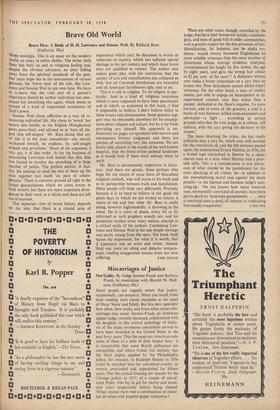Brave Old World
Brave Men: A Study of D. H. Lawrence and Simone Weil. By Richard Rees. (Gollancz. 18s.)
MORE nostalgia. This is an essay on the modern World, an essay in entire dislike. The writer feels there has been an end to religious feeling and, despite the obvious advances, an utter falling away from the spiritual standards of the past. Our main hope lies in the intercession of certain geniuses, the 'brave men' of the title, like Law- rence and Simone Weil in our own time. We have to re-learn that the vital part of a person's experience should be neither individual nor com- munal but something else again, which seems to consist of a kind of impersonal acceptance of God's power.
Simone Weil chose affliction as a way of re- nouncing individual life. She chose to 'wreck' her nature into health, as the English Metaphysical poets prescribed, and advised us to 'turn all dis- gust into self-disgust.' Mr. Rees denies that any of this is in the least masochistic—she merely weakened herself, he explains, by `self-sought ordeals and privations.' Much of his argument, I may say, is of that order. As for the business of associating Lawrence with beliefs like this, that was bound to involve the stretching of a large number of points. The preface admits, in fact, that the attempt to send the two of them up the aisle together , was made `on pain of schizo- phrenia.' There is common ground all right in the broad denunciations which we come across in both writers, but there are more important diver- gences in their work as a whole and these are left out of account.
This lapsarian view of recent history depends on the idea that' there is a crucial area of experience which can't be discussed in words or subjected to inquiry, which has suffered special damage in the last century and which these brave men are qualified to restore. The author also makes great play with his conviction that the quality of arts and manufactures has collapsed as well, that all Cotswold farmhouses are beautiful and all American farmhouses ugly, and so on.
This is a call to religion. To no religion in par- ticular. And to a kind of religious awareness which is once supposed to have been paramount and in which, as expressed in this book, I find it impossible to believe. I don't believe either in these breaks and diminuendos. Some genuine sup- port may be obtainable elsewhere for his assump- tions about religion and culture, but he is far from providing any himself. His approach is un- historical, his pages are sprinkled with narrow and intemperate literary judgments and there are patches of something very like nonsense. We are firmly told, almost in the words of the well-known limerick, that the finest artists painted landscape as it would look if there were nobody there to' see it.
Mr. Rees is uncommonly responsive to litera- ture. And there are people, those perhaps who hope for the return of some form of liberalised religious outlook, who will warm to his book and to its partnership between truth and humiliation. Other people will think very differently. Precisely because it is so hard to believe in the good old pious days to which we are invited to return, it seems in the end that what Mr. Rees is really doing, however highmindedly, is throwing in the towel. He is a voice of doom, every bit as ill- informed as such prophets usually are, and his pessimism washes away every serious attempt at a critical study of his authors. Combining Law- rence and Simone Weil in the one simple message was surely wrong from the start. The book itself leaves the impression, for what it is worth, that if Lawrence was an artist and writer, Simone Weil was more an ailing and didactic tempera- ment, reading exaggerated lessons from her own


































 Previous page
Previous page